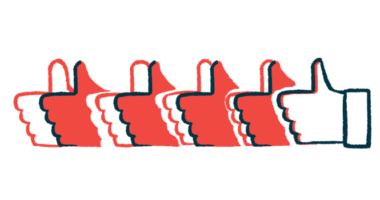NurOwn and its exosomes given patents in Europe, Australia, Israel
Confirmatory Phase 3 trial may be planned for potential ALS cell therapy

BrainStorm Cell Therapeutics has received patents in Europe, Australia, and Israel covering the use of investigational NurOwn and NurOwn exosomes in treating amyotrophic lateral sclerosis (ALS) and other neurological disorders.
The European patent specifically covers the use of an isolated population of mesenchymal stem cells — the cells used to produce NurOwn — in people with ALS. It also covers a method of qualifying whether a cell population is suitable for treating ALS.
“The recent acquisition of the European patent for our unique [NurOwn] cell population marks an important step in safeguarding our proprietary NurOwn technology, particularly for ALS treatment,” Chaim Lebovits, BrainStorm’s CEO, said in a company press release.
NurOwn aims to treat ALS by promoting nerve cell growth and survival
“Securing this European patent, alongside our existing patents in the US, Canada, Israel, Brazil, and Japan, enhances our capability to forge new global commercial partnerships, further expanding the reach of NurOwn,” he added.
The Australian and Israeli patents cover the use of exosomes — small vesicles released by virtually all cells that contain proteins and other molecules important for cellular communication — derived from NurOwn cells in treating neurodegenerative conditions.
NurOwn is an experimental cell-based therapy designed to slow ALS progression and extend survival by boosting nerve cell survival.
It involves collecting mesenchymal stem cells — which can differentiate into a variety of cell types — from a patient’s bone marrow and maturing them in the lab into cells that produce high levels of neurotrophic factors, or signaling molecules that promote nerve cell growth and survival.
The mature cells, called MSC-NFTs, then are returned to the patient via injections into the spinal canal, where they release the molecules protective of motor neurons, which is expected to slow disease progression.
“The Australian patent, which is our inaugural grant for the specialized MSC-NTF cell exosomes, represents a pivotal achievement in the evolution of our exosome technology,” Lebovits said.
The company also is developing a distinct therapy using exosomes derived from MSC-NFT cells, expected to transport neurotrophic factors and other signaling molecules to a patient’s nerve cells.
BrainStorm completed a Phase 3 trial (NCT03280056) of NurOwn’s safety and efficacy in 189 adults with rapidly progressing ALS. Participants received three injections, given at two-month intervals, of either NurOwn or a placebo.
Treatment failed to significantly slow disease progression, based on the ALS Functional Rating Scale-Revised (ALSFRS-R), trial results showed. But BrainStorm argued that the lack of a significant effect could be due to a floor effect, meaning treated patients had such advanced disease that a slowing in disease progression could not be detected.
A clinically meaningful response to NurOwn treatment was seen among a patient group with less severe disease.
New Phase 3 clinical trial of NurOwn in ALS patients possible
A U.S. Food and Drug Administration (FDA) advisory committee subsequently found that evidence was lacking to support NurOwn in treating ALS, leading BrainStorm to withdraw its application for NurOwn’s approval.
Company and FDA officials recently discussed plans for a confirmatory Phase 3b trial of the cell therapy, intended to ensure the study’s design meets agency requirements to support a future application.
NurOwn technology has been designated an orphan drug by the FDA and the European Medicines Agency as a potential treatment of ALS. This status is given to therapies aiming to treat rare diseases, and it provides developers with benefits that include exemption from regulatory fees, assistance with clinical trial protocols, and several years of market exclusivity if the therapy is approved.







